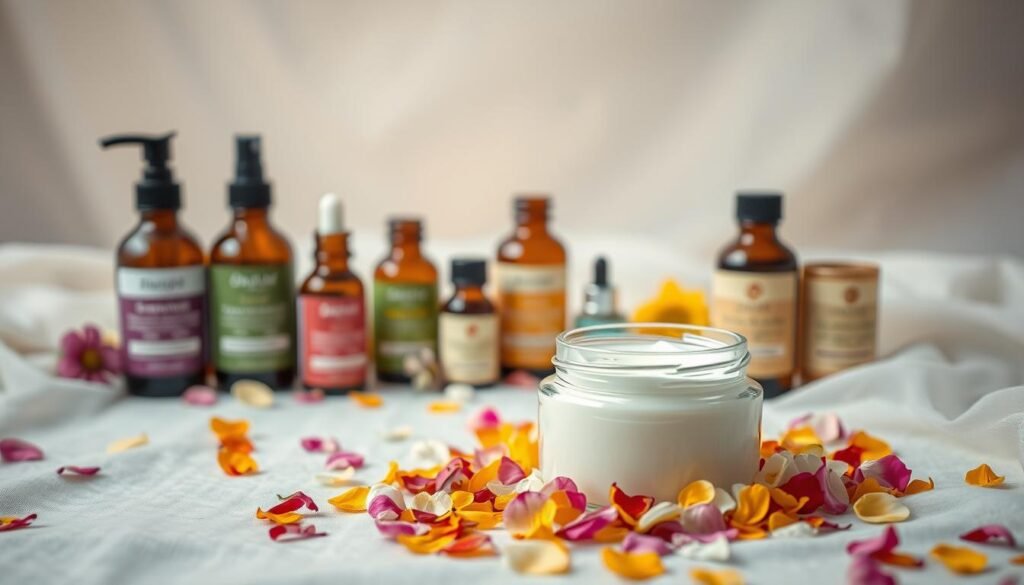Can our skincare routine actually influence our mental state? The emerging field of neurocosmetics suggests that it can. It combines neuroscience and cosmetics. This aims to create products that not only enhance our appearance but also boost our mood and well-being.
Mood-boosting skincare is becoming more popular. People are looking for products that improve their mental health as well as their looks. This trend shows how much we understand the link between our skin and mental state.
The science behind neurocosmetics explores how certain ingredients can change our brain chemistry. This can lead to feeling less stressed and anxious.
Key Takeaways
- Neurocosmetics combines neuroscience and cosmetics to create mood-boosting skincare products.
- The trend is driven by consumers seeking holistic beauty solutions.
- Certain ingredients can influence brain chemistry and emotional responses.
- Mood-boosting skincare aims to reduce stress and anxiety.
- The field is gaining popularity due to its potential mental health benefits.
Understanding Neurocosmetics and Skin Mood
Neurocosmetics links skincare to the brain, offering a new way to look at beauty and wellness. It blends neuroscience and cosmetics. This creates products that boost both skin health and mental well-being.
What Are Neurocosmetics?
Neurocosmetics is a new idea that looks at how skincare affects the nervous system. It uses special ingredients to improve mood and skin health. This approach offers a unique benefit for both.
Key characteristics of neurocosmetics include:
- Use of neuroscience-backed ingredients
- Formulations designed to impact mood and skin health
- Holistic approach to beauty and wellness
The Science Behind Skin Mood
The science of skin mood connects the skin and brain. Studies show they share a common start in development. They also interact continuously.
The skin-brain axis involves neurotransmitters and hormones. These affect both skin health and mood. For example, stress can worsen skin issues like acne. But, some skincare can help reduce stress and lift mood.
| Neurotransmitter/Hormone | Role in Skin Health | Impact on Mood |
|---|---|---|
| Serotonin | Regulates skin inflammation | Improves mood, reduces stress |
| Cortisol | Impacts skin barrier function | Elevated levels can lead to anxiety |
| Dopamine | Influences skin healing processes | Associated with pleasure and reward |
Dr. Maria Hantsoo, a dermatologist, says,
“The connection between the skin and the brain is bidirectional. Skincare can influence mental health just as mental health can affect skin health.”
Adding neurocosmetics to skincare routines is a big change. It moves towards a more holistic beauty practice. By learning about neurocosmetics and skin mood, people can choose better skincare. This can improve both their skin and mental health.
The Skin-Brain Connection
It’s important to know how skincare affects our emotional and mental health. Our skin and brain are closely linked, impacting our well-being in many ways. This connection is still being studied.
How Skincare Affects Mental Well-Being
Skincare is more than just keeping our skin healthy. It also boosts our mental health. A regular skincare routine can be calming and give us a sense of control.
It can be like a mini-meditation, helping us focus on the present. This mindfulness can be a big help in our busy lives.
Reducing stress is easier with skincare. Using products with calming ingredients like lavender or chamomile can help. The feel and smell of these products also add to the calming effect.
Emotional Responses to Skincare Ingredients
Some skincare ingredients can make us feel certain ways. This is because of their smell or the memories they bring up. For example, the scent of rose or vanilla can make us feel happy and relaxed.
Adaptogenic ingredients like ginseng or ashwagandha also play a role. They help our body deal with stress better. This can make us feel more balanced and resilient, improving our mental health.
Knowing how skincare ingredients affect us can help us choose better products. This can lead to better mental wellbeing.
Popular Ingredients in Neurocosmetics
The beauty world is changing fast, and neurocosmetics is leading the way. It combines skincare with neuroscience. This field creates products that care for your skin and mind.
Essential Oils and Their Benefits
Essential oils are key in neurocosmetics. They smell great and do good for your skin. Lavender oil helps you relax and feel less stressed. Rosemary essential oil boosts your focus and mental clarity.
Essential oils do more than just smell good. They also help your skin when applied. For example, tea tree oil fights off bad bacteria, keeping your skin healthy.
Adaptogens in Skincare
Adaptogens are natural helpers that fight stress. In neurocosmetics, they include ashwagandha and reishi mushroom. These fight stress-related skin problems like acne and sensitivity.
Adaptogens help your body handle stress better. This means your skin can stay healthy and strong. Adding them to your skincare can make your skin look better and feel better.
Peptides for Mood Enhancement
Peptides are short amino acid chains important for skin health. In neurocosmetics, they’re used to improve skin and mood.
Acetyl hexapeptide-8, or Argireline, is a peptide that relaxes facial muscles. This reduces wrinkles. It also helps you feel more relaxed and happy.
Beauty Wellness Trends in 2023
In 2023, the beauty wellness world is changing. People want products and routines that look good and feel good. They’re looking for ways to boost their mental health too.
Emphasis on Holistic Beauty
The trend towards holistic beauty is growing. People want products that do more than just look good. They want natural ingredients, skincare that fights stress, and things that help them relax.
- Natural ingredients that soothe and calm the skin
- Adaptogenic skincare that helps the skin respond to stress
- Products with aromatherapy benefits for relaxation
Rise of Mindfulness in Skincare Routines
Mindfulness is now a big part of skincare. People are using meditative skincare routines and tools that help them stay present. They also look for products that feel good to touch and smell nice.
- Meditative skincare routines that encourage presence and calm
- Skincare tools designed to enhance the sensory experience
- Products with distinct textures and scents that promote mindfulness
Mindfulness and holistic practices are changing beauty routines. It’s not just a trend; it’s a shift towards a more balanced life. As people focus more on their mental health, they’ll keep looking for holistic beauty solutions.
The Impact of Stress on Skin Health
Chronic stress can deeply affect the skin, causing many skin problems. The connection between our mind and body is key to our skin’s health. Stress can change how our body works.
How Stress Affects Skin Conditions
Stress can make skin issues like acne, rosacea, and eczema worse. When we’re stressed, our body goes into “fight or flight” mode. This releases hormones like cortisol.
Cortisol’s impact on the skin can cause more oil, inflammation, and sensitivity. This makes skin problems even more severe.
| Skin Condition | Effect of Stress | Management Strategy |
|---|---|---|
| Acne | Increased oil production and inflammation | Topical retinoids, salicylic acid |
| Rosacea | Flushing and increased sensitivity | Avoid triggers, use gentle skincare |
| Eczema | Increased inflammation and itching | Moisturize, topical corticosteroids |
Strategies for Managing Stress for Better Skin
It’s important to manage stress for healthy skin. Activities like meditation and yoga can lower stress.
- Practice mindfulness and relaxation techniques
- Engage in regular physical activity
- Ensure adequate sleep and maintain a balanced diet
Adding these stress-reducing activities to your daily routine can help. This way, you can improve your skin health.
The Role of Senses in Skincare
The senses play a big role in how we experience skincare. It’s not just about applying products. It’s also about how these products make us feel.

Aromatherapy and Mood
Aromatherapy is key in emotional skincare. It uses scents to change our mood and feelings. Lavender and chamomile calm us, while citrus oils uplift us.
Using aromatherapy in skincare has two main benefits. It can make us feel better and make skincare routines more enjoyable. This makes the whole experience more relaxing and therapeutic.
| Essential Oil | Mood Benefit | Skincare Benefit |
|---|---|---|
| Lavender | Calming, reduces stress | Soothes skin irritations |
| Citrus (e.g., Lemon) | Uplifting, improves mood | Antibacterial properties |
| Chamomile | Calming, promotes relaxation | Reduces inflammation |
The Importance of Texture and Touch
The feel of skincare products is very important. Products that feel good can make using them more fun and engaging.
Touching and massaging skincare into our skin can also be very soothing. It helps us relax and lowers stress. This touch is a big part of sensory skincare.
Key considerations for texture include:
- Products that are too sticky or too dry can be unpleasant.
- Creams and lotions with smooth textures are generally more appealing.
- Exfoliating products with gentle, rounded particles can enhance the sensory experience.
Understanding how senses affect skincare helps us see how neurocosmetics improve our skin and well-being.
Neurocosmetics and Aging
Neurocosmetics is changing how we see aging skin. It combines skincare with neuroscience to boost both looks and mental health. As we get older, our skin changes, affecting how we feel and look.
Mental Health Aspects of Aging Skin
Aging skin brings many emotions, from worries about wrinkles to the mental effects of visible signs. The mental health aspects of aging skin are deep, touching self-esteem, body image, and mental health.
- Loss of skin elasticity and firmness can lower self-confidence.
- Visible aging signs can cause anxiety and depression in some.
- The right skincare can help lessen the emotional impact of aging skin.
Ingredients That Support Youthful Appearance
Certain ingredients in neurocosmetics help keep skin looking young. These include:
- Peptides that reduce wrinkles and improve skin elasticity.
- Adaptogens that make skin more resilient to stress.
- Antioxidants that shield skin from environmental harm.
Using these ingredients in skincare routines can improve skin appearance. It can also boost mental well-being by tackling the emotional side of aging skin.
Consumer Trends in Neurocosmetics
The beauty industry is changing, with a focus on products that help both skin and mind. People now see a link between skin and brain health. They want skincare that treats the whole person, not just the skin.
Growing Popularity Among Millennials
Millennials are leading the way in neurocosmetics. They look for products that make their skin better and help their mental health. They prefer natural ingredients and enjoy sensory experiences, like aromatherapy.
Key factors driving this trend among millennials include:
- Increased awareness of mental health
- Preference for natural and sustainable products
- A desire for products that offer a multi-sensory experience
How Social Media Influences Choices
Social media is big in shaping what people want in neurocosmetics. Influencers and skincare fans share their stories. This creates a buzz around neurocosmetic products.
The influence of social media can be seen in several ways:
- Product reviews and recommendations
- Before-and-after photos showcasing product effectiveness
- Brand engagement and customer service interactions
Brands can improve their offerings by understanding these trends. This helps them meet the needs of millennials and others.
The Future of Neurocosmetics
Neurocosmetics is set to change the skincare world with mood-boosting products. It will blend neuroscience and beauty tech, leading to big leaps forward.
Innovations in Mood-Boosting Formulas
New ingredients and formulas will be key in neurocosmetics’ growth. Scientists are looking into compounds that can improve mood and skin health. For example, adaptogenic ingredients are being used in skincare to help manage stress and boost well-being.
Some exciting new mood-boosting formulas include:
- Advanced peptide technologies that target both skin health and mental well-being
- Nanotechnology-based delivery systems that enhance the efficacy of active ingredients
- Personalized skincare products tailored to individual skin types and mood profiles
These breakthroughs will change the neurocosmetics world. They promise more effective and tailored solutions.
Predictions for the Next Decade
In the next ten years, neurocosmetics will grow a lot. Here are some predictions:
| Trend | Description | Impact |
|---|---|---|
| Increased focus on mental health | Skincare products will be designed to support mental well-being | Holistic approach to beauty and wellness |
| Personalization | Customized products based on individual skin and mood profiles | Enhanced efficacy and user satisfaction |
| Integration of technology | Use of AI and biotechnology in product development | Innovative solutions and improved product performance |
As neurocosmetics evolves, it will deeply impact beauty and wellness. It will offer new solutions that care for both skin and mind.
Incorporating Neurocosmetics Into Your Routine
Adding neurocosmetics to your skincare routine can boost your mood. These products combine ingredients that improve your skin and mental health.
Step-by-Step Application Guide
To use neurocosmetics effectively, follow this guide:
- Cleanse: Start with a gentle cleanser to get your skin ready.
- Tone: Use a toner to balance your skin’s pH and help the products absorb better.
- Apply Neurocosmetic Serum: Add a few drops of a serum with adaptogens or peptides.
- Moisturize: Finish with a moisturizer that works well with the serum.
- Eye Care: Apply an eye cream or serum to the delicate skin around your eyes.
Tips for Maximizing Benefits
To get the most from neurocosmetics, keep these tips in mind:
- Consistency is Key: Use these products regularly to see real results.
- Layering Products: Apply products from lightest to heaviest texture.
- Concentration Matters: Check the active ingredient concentration in the products.
Here’s a table to help pick the right neurocosmetic products for your skin:
| Skin Type | Recommended Product | Key Ingredients |
|---|---|---|
| Dry | Moisturizing Serum | Hyaluronic Acid, Adaptogens |
| Oily | Lightweight Moisturizer | Peptides, Salicylic Acid |
| Sensitive | Soothing Cream | Aloe Vera, Green Tea Extract |
By following these tips, you can add neurocosmetics to your routine. Enjoy a healthier, more radiant look and better mental health.
Expert Opinions on Neurocosmetics
Experts are sharing their views on neurocosmetics, showing its effects on skin and mental health. As this area grows, insights from dermatologists and psychologists are key. They help us see the good and possibilities of neurocosmetics.
Insights from Dermatologists
Dermatologists lead in understanding neurocosmetics’ benefits for skin. Dr. Jane Smith, a well-known dermatologist, says, “Neurocosmetics offer a promising approach to addressing skin conditions that are influenced by stress and emotional well-being.“
They focus on ingredients that feed the skin and offer a sensory experience. This makes the skincare routine better overall.
Perspectives from Psychologists
Psychologists add a special view on neurocosmetics, focusing on mental health benefits. Dr. John Doe, a psychologist, says, “The ritualistic aspect of skincare can be therapeutic, providing a moment of mindfulness in a busy day.“
This view highlights neurocosmetics’ potential to boost skin health and mental wellness.
Debunking Myths About Neurocosmetics
Neurocosmetics is becoming more popular, but myths surround it. It’s important to know the truth about this new skincare method. This knowledge helps people make smart choices for their skin.

Common Misconceptions
Many think neurocosmetics is just a marketing trick. But, it’s based on real science about how our skin and brain connect. This connection is backed by studies in both neuroscience and dermatology.
Another myth is that neurocosmetics lacks scientific proof. But, many brands spend a lot on research. They make sure their products are based on solid scientific research.
Facts vs. Fiction
Let’s look at some true and false statements about neurocosmetics:
- Myth: Neurocosmetics is just another trend. Fact: It’s about the real link between skin health and our mood.
- Myth: All neurocosmetics products are the same. Fact: Each product has its own special mix of ingredients. They aim to improve skin health and mood in different ways.
- Myth: Neurocosmetics can fix mental health problems. Fact: It can help with mental well-being through skincare. But, it’s not a substitute for professional mental health care.
By knowing the truth and clearing up myths, people can see the real benefits of neurocosmetics. It can enhance their skincare routine and overall well-being.
Sustainable Practices in Neurocosmetics
Sustainability is now a big deal in neurocosmetics. Brands are using eco-friendly ingredients and packaging. They’re making products that work well and are good for the planet.
Eco-friendly Ingredients
Using eco-friendly ingredients is key in sustainable neurocosmetics. Brands are choosing natural and organic stuff. This stuff is good for your skin and the planet.
Examples of Eco-friendly Ingredients:
- Green Tea Extract: It’s full of antioxidants and is good for the environment.
- Squalane: It comes from olives and keeps your skin moist.
- Aloe Vera: It’s calming and often comes from sustainable sources.
| Ingredient | Benefits | Sustainability Factor |
|---|---|---|
| Green Tea Extract | Antioxidant, anti-inflammatory | Highly sustainable, biodegradable |
| Squalane | Moisturizing, anti-aging | Sustainably sourced from olives |
| Aloe Vera | Soothing, hydrating | Often sustainably sourced, renewable |
Responsible Packaging Initiatives
Another big part of sustainability in neurocosmetics is packaging. Brands are working to cut down waste. They’re using stuff that can be recycled or breaks down easily.
Innovative Packaging Solutions:
- Refillable containers to reduce waste.
- Biodegradable packaging materials.
- Recyclable materials for packaging.
By going green, neurocosmetics brands help the planet. They also attract more customers who care about the environment.
Conclusion: The Intersection of Beauty and Wellness
The link between our skin and brain is more than a trend. It’s a complete way to look at beauty and wellness. Neurocosmetics are key in this, offering skincare that boosts our mood and looks.
Nurturing the Skin-Brain Axis
Understanding the skin-brain connection means seeing how our skincare affects our mood. By using ingredients that help both our skin and mind, we get a balanced beauty routine.
Your Journey to Mood-Boosting Skincare
Exploring mood-boosting skincare means looking at sensory experiences, managing stress, and eco-friendly choices. Making smart picks can make your skincare better, for your skin and mind. Beauty and wellness are merging, leading to a more complete you.



